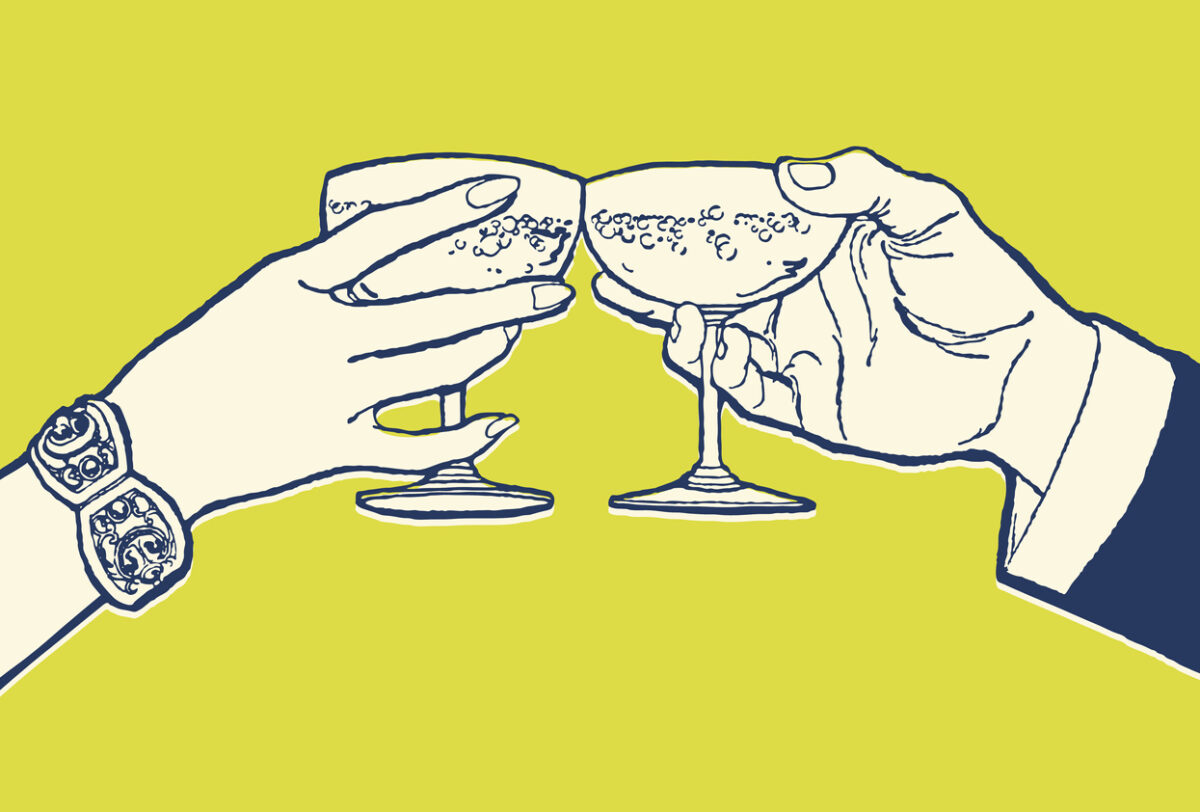Mixing business with pleasure: successful food and drink companies founded by couples

Don’t mix business with pleasure is a saying we’ve all heard, but for many couples doing the exact opposite and launching a company together has been fruitful, and has brought them closer together.
As with everything in life, there are upsides and downsides to starting a business venture with a romantic partner. The responsibilities of running a company can make or break a couple, but every year thousands of people in the UK take a chance and give it a go.
There are several factors to consider before launching a brand with a partner, to avoid arguments and burnout. “It is vital when couples start in business together to have clear boundaries and bright lines set between the business and home life. A new venture is exciting and engaging, and building a business together takes energy and can bring you together working towards the same goal“, says psychologist, wellbeing consultant and founder of Essentialise Workplace Wellbeing Lee Chambers. “You need to set clear boundaries on when you are working, both together, and sometimes separately, so you understand when you are available and you’re not always working together. Having clear roles and duties also makes it transparent who actions and reports on specific areas.
“It is also worthwhile scheduling specific time for rest and recuperation, again both together and separately, and to segment times to be with family, and to be together as a couple, not a business partnership. There is also the balancing of parental and household responsibilities, which should be clearly defined in a fair way, as well as planning to celebrate your individual strengths and wins. And finally, consider the environments you work in, and if there is a need for partition or separation and a productive way to handle conflict, that is healthy and gives space to express differences, which are often beneficial for business growth and home harmony.”
For Dannielle Haig, Principal Business Psychologist at DH Consulting, couples should be mindful of how they treat each other in a working environment and they should factor in the amount of time they are bound to spend together. “There are many examples of couples working successfully together, however, there are challenges that need to be acknowledged. Firstly, running any business with another person or not is difficult. It’s emotionally, physically, mentally, and financially stretching which results in us experiencing heightened emotions. If we are working with someone else, who we don’t know intimately, we’re more likely to restrain from expressing those emotions. If you’re in close proximity to your partner, often when feeling this stretch, you’re less likely to be reserved in expressing your emotions which could, over time, be damaging to your romantic relationship.
“You are likely to spend a huge amount of time together both during the working day and out of work, if you’re not used to being together, then it may be a shock to the system. Be mindful that many of us are different when we’re in work than in our personal lives, so you may see a different side to each other. That doesn’t necessarily mean that it’s bad, but it’s different, and that needs to be prepared for.”
There are however positive aspects to working with a partner, according to Dannielle. “There are pros to starting a business with your partner, mainly that you’re both invested in the same venture. You are working with your best friend and confidante on something for you to both benefit from together. Being able to trust your business partner is extraordinarily important and not always easy to do. So, partnering with the person you probably trust the most in the world could remove a lot of fears and concerns.”
Not bringing a couple’s private life into the work environment is key to a harmonious and successful business partnership, says Haig. “If you’ve had a personal argument in the morning but have a client pitch meeting a few hours later, are you able to forget it and work together as team? The lines between work and home are blurred and it can make it difficult to have a good work or personal relationship.”
For Lee Chambers, working together as a couple can improve the relationship and even add sparkle. “There are both a range of benefits and drawbacks when it comes to working with a partner. It can bring you closer together, especially those whose careers keep them apart. It can certainly be a catalyst to improving communication and stating your needs and highlight the skills and appreciation for what each other is capable of. It can be a source of fun in a relationships, and cultivate the fulfilment of joint success in union. It can also highlight inequalities and attitudes and creates a business case for these to be addressed fairly in a shared way. And there is the potential to build together, going through both the wins and losses, and working on designing a life together that works for both sides.“
Stress is something to look out for, and the risk of either a romantic or business split, must be factored in, says Lee: “Naturally, being in business together has challenges to face. Running a business has plenty of stress involved, as it has meaning and is a responsibility. This can easily generate stress within your relationship, and boundaries can become blurred, especially in challenging times. You are also likely to be at a higher financial risk when both are invested in the same business, and these stresses can end up with blame apportioned or limited family spending, which can impact the relationship outside of the business.
“There is even the reality of you splitting as either partners or business partners in the future, which can happen and can become complex quickly. And businesses run by couples can sometimes lack an external perspective – and it’s not always easy to have those honest conversations about things that are going wrong. And it’s a challenge and pressure moving towards a shared vision if you have differing expectations, lack autonomy or don’t take the time to unplug and disconnect.”
One of the challenges that couples who work together face is taking their work issues and, sometimes, conflicts home, and not being able to switch off. “Boundaries are fundamental for a successful couple working relationship.“, says Dannielle Haig. “When you run your own business, you’re thinking about it all the time so it would be highly tempting and easy for a couple owning a business together, to talk about it day and night, and nothing else.
“To keep the distinction between the two relationships, and to preserve the romantic element of the relationship, I would put a time limit on work talk in the evenings and weekends. After work, by 7pm for example, you can’t talk about work anymore, as you wouldn’t with another business partner. You must preserve the other elements of your lives together and invest in individual hobbies to ensure you have time for personal recovery and development too.”
For Chambers, open and honest communication and avoiding second guessing each other is of the uttermost importance for a healthy relationship: “When it comes to couples in business, prevention is always better than reaction. It is important not to try and mind-read each other, but to take time to see if you have the same vision and thoughts. It is important to voice concerns in a non-judgemental and blameless way, and create space for your partner to do the same. Being truthful and addressing tension is paramount to ensure it doesn’t fester and become resentment, and communicating with compassion and clarity ensure conflict isn’t avoided or inflamed.“
Having some space to breathe and remembering why as a couple you got together in the first place is also essential, advises Lee: “It is important to have those boundaries, to ensure you have time for recovery and self-care, as looking after yourself means you are emotionally balanced together. Going out and having fun as a couple, unplugging and being partners, helps to create separation from the business that would creep in if you didn’t do it with intention. And consider how and where you work, ensure you have the space and flexibility, and have those clear roles and responsibilities that help structure your business lives, and don’t forget to evaluate and evolve these over time.”
Dannielle Haig agrees: “Have regular dinners as a couple where work isn’t a topic, which I know can be difficult when you’re both invested in something. But you must preserve life beyond work. Perhaps a weekend away from home and office will help to discover a new place together and would help physically and mentally separate your personally relationship from your work life.”
How we do it: Lot 42 founders and couple Dale Milliken and Chris MacDonald

Chris, Dale and their dog Max
Chris, Dale and their dog Max
Dale Milliken and Chris MacDonald had been together for a year before they decided to launch Lot 42, a brand selling premium flavoured alcoholic sparkling water. Dale and Chris had been friends for several years and had travelled extensively around Europe together before falling in love and becoming a couple. They brought their own expertise to Lot 42. Scottish co-founder Dale isan award-winning cultural insight expert and brand developer and already knew the drink industry well, having worked as senior global consumer strategy manager for Pernod Ricard’s scotch whisky and gin portfolios. He had also trained at Unilever where he led Insights & Strategy on the AXE/ LYNX master brand, so he knew the consumer market inside out.
Prince Edward Island native Chris started his career in Beijing and trained as an accountant at PWC in London. He also had extensive experience in the beverage sector, having worked for four years as an equity analyst covering European Drinks companies at REDBURN, the top ranked brokerage in London, and later joined Heineken. At Heineken he has worked in investor relations and most recently, as right hand and special assistant to the CFO.
What have been the challenges and the highs of starting a company and working together?
Dale: Sharing the highs of starting a company with the person you love is incredible. You are on the journey together from day one, creating amazing memories as you go. Even when it comes to the lows, you each know exactly what the other has gone through. Unlike a regular work-life situation, where your other half doesn’t quite know the full story, here your partner truly knows exactly how you are feeling.
Chris: There are highs and lows for sure! The highs are something unique that neither of us has experienced in a relationship before and it has brought us closer as a result. We’ve sort of been to the wars together to build our brand and feel a bit like it’s us vs. the world and we will both do anything to make our brand bigger and stronger. So it pulls us together, it makes our relationship stronger.
Do you manage to switch off from your business and not take it home, and if so, how do you do it?
D: This is something we’ve had to practise becoming better at. We both work from home – our office is also our loft where we hang out in the evenings. We’ve had to train ourselves to not check emails at weekends. One glance at the inbox, leads to ‘work chat’, which quickly switches you back into work mode. As a challenger brand, there is always something urgent to do. It is sometimes easy to forget that logging off is an important part of the process. Some of the best decisions we’ve made have been after a run, a dog walk or bike ride. We approach running the business as we did when we were employed full-time: work hard, work through your to-do list but learn when to call it a day. Some things can wait until tomorrow.
C: Our dog Max keeps us sane. We get out of the home office and take him for walks a couple of times a day. We should keep this as work free time, but it is often time for some of our best conversations about the different challenges we are both working through.
With COVID, we have been working from home and so we have had to be pretty clear that after a certain time, it’s work free time because otherwise we would never switch off. We came up with the idea for our business while on an adventure in our camper van and its still our favourite place to go and switch off from everything around us. Hopefully with the end of COVID travel restrictions we will be able to do this more often!

Lot 42 alcoholic sparkling waters come in Blueberry & Lemongrass and Huckleberry & Ginger flavours, are vegan friendly, gluten-free, GMO-free and contain no sugar.
Lot 42 alcoholic sparkling waters come in Blueberry & Lemongrass and Huckleberry & Ginger flavours, are vegan friendly, gluten-free, GMO-free and contain no sugar.
Has there ever been a moment when you felt that working together might have a negative impact on your romantic relationship? How have you dealt with the situation?
D: Remembering that this is your partner, this is someone you care deeply about. We all have bad days and good days, running a business together is an emotional rollercoaster ride. We’ve had to quickly learn to play to each other’s strengths and understand where each other’s weaknesses lie. In a start-up you’ve got to be the master of everything, quickly. But it’s worth remembering that we’re all only human and nature hasn’t programmed us to be good at everything. As a new business you’ll both try to step up and impress each other, picking up every single thing you possibly can. However, it is important to be completely honest and up front with your partner when you feel you’ve taken on too much, if you feel you can’t deliver on time or if you’ve realised you are out of your depth. Don’t be afraid to ask your partner for help if you need it. Also talking through all the other daily stresses is equally as important. If you are having a rough day, you’re in a bad mood or just struggling at that moment in time, tell them – communication is key to success.
C: Of course. Operating a business together means making decisions together and separately that will impact the business and sometimes we don’t always agree with one another or agree with something the other has done. Depending on the size of the agreement, it can have a big emotional impact. We have to compartmentalise these types of situations and feelings and put them aside at the end of the day because otherwise it would carry over into our evening and personal time. If we didn’t do that then I don’t think we would still be running this business, or be together as a couple.
What advice would you give to another couple thinking of starting their own business venture together?
D: Often you can get quickly caught up in the passion you have for your brand, the excitement, the buzz of it all. Whilst this is amazing, and of course it is important to look at all you want to achieve with your new brand, it is also really important to ensure you get excitement out of your day to day. What role do you and your partner want to play in growing the business? What will get you excited each day and what will play to your strengths? Discuss who will be responsible for what and then trust one another to make the right decisions.
C: If you think you can do it, go for it. If you can do it where one person keeps their salaried role, even better.
5 start-ups founded by couples
Beau’s Gelato
Winner of Food Matters Live 2021 Awards’ Plant-Based Product of the Year, Beau’s Pint Club, is UK’s first ice cream subscription service. The plant-based gelato company was founded by real life couple Joseph Eyre and Amber Fox-Eyre. The partners worked in nursing and finance and didn’t have a food background before launching their business, but a shared passion for traditional Italian ice-cream inspired Joseph and Amber to start their own business.
Oddbox
Emilie Vanpoperinghe founded Oddbox with husband Deepak Ravindran in 2016. Oddbox is a flexible subscription service that delivers surplusfruit and veg to customers’ doors. The ‘too big’, ‘too small’, ‘too wonky’ fruit and vegetables have been fruitful (excuse the pun) for the couple, and Oddbox has proved to be a success for Emilie and Deepak, as well as for the environment as the start-up’s main goal is to do reduce food waste.
Manfood
Andre Dang, a former buyer for Harrods and Selfridges, and his husband Jon, founded Manfood after 14 years togethers. “The business started because I kept finding half eaten jars of piccalilli in our fridge, and when I asked my husband Jon why, he said he had yet to find a decent piccalilli that was chunky and full of flavour,” Andre tells me. “I offered to make him one, and he loved it so much, he asked me to sell it.” Manfood has been making chutneys, jellies, piccalillis, sauces and condiments for eight years and after 22 years, Andre and Jon are still happily together – with a successful business to boot.
SeaArch
Married couple Sarah and Geoff Yates founded start-up SeaArch, a distilled non-alcoholic spirit from the Devon coast and winner of Food Matters Live 2021 Awards’ New Drink of the Year. Sarah was working as a trainee housekeeper in a hotel when she met pastry chef Geoff. Soon after getting together, the couple set up dessert manufacturing businessChantilly Patisserie, their first company together. The business became a national success supplying quality desserts for the catering trade. After gaining a First-Class honours degree in Business and Administration, Sarah opened a popular and award winning wine bar and after sellingChantilly Patisserie and later the wine bar, the married couple went on to found SeaArch.
Family Secret
Sunny and Harmeet Mudhar were inspired to launch cooking sauces and snack start-up Family Secret after travelling around the world on their honeymoon. Soon after the launch, they partnered with Virgin Trains and LNER Trains who sold the start-ups poppadoms and dips boxes. Family Secret is now stocked by Ocado, Holland and Barrett, Amazon and WHS Smith across 10 counties and 50 airports. In 2021 the start-up pitched to investors at Food Tech Matters and appeared on popular BBC TV show Dragons’ Den.








